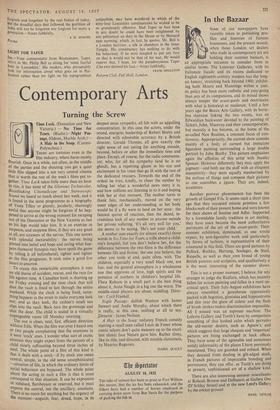Contemporary Arts
Turning the Screw
Time Lock. (Dominion and New Victoria.) — No Time for Tears. (Rialto.)—Night Pas- sage. (Odeon, Marble Arch.)— A Hair in the Soup. (Cameo- Polytechnic.) THERE are tortoises even in the film industry, where hares mostly flourish. Once in a while, not often, in the middle of the parties and the shouting you get a quiet little film slipped into a not very central cinema that is worth the rest of the week's films put to- gether. Time Lock takes little more than an hour to run, it has none of the Glorious Technicolor, Breathtaking CinemaScope and Stereoscopic Sound we heard so much about last week, and it is found in the same programme as a biography of Vesta Tilley so glumly, jocularly, shamingly awful that anyone might be forgiven if he hap- pened to arrive at the wrong moment for escaping out of the Dominion or the New Victoria as fast as his legs would take him. It is an exercise in suspense, and suspense films, if they are any good at all, are screwers of the nerves. This one screws with splendid ,inexorability : the nerves being Pinned into belief and hope and caring what hap- pens (however Synopsis may have spoilt the game by telling it all beforehand), tighter and tighter as the film progresses. It took mine a good five hours to unscrew.
To create this remarkable atmosphere it uses an old theme of accident, rescue, and the race for life against time. A Canadian bank is shutting up on Friday evening and the time clock that will shut the vault is fixed to last through the entire weekend. While the clock is being fixed, some- thing happens in the street to make everyone look out; and as they look, the cashier's small son slips into the vault. Back turn the grownups and shut the door. The *child is sealed in a virtually impregnable room till Monday morning.
The rest is clean, neat, fast, efficient direction without frills. When the film was over I heard one or two people complaining that the emotions in it were 'stock' ones. I wonder what sort of exotic emotion they might expect from the parents of a child slowly suffocating beyond three inches of steel. The whole point of a film of this kind is that it deals with a stock—if by stock you mean central, simple, in the old sense unsophisticated —situation of life, in which the ordinary limits of social behaviour are bypassed. The whole point about the acting in such a film is that it must correspond to that situation. It can be expressive or subdued, flamboyant or reserved, but it must express the central, not the ancillary, emotions. There is no room for anything but the urgency of the moment—anguish, fear, dread, hope, in its
deepest sense sympathy, all felt with an appalling concentration. In this case the actors, under the sound, energetic leadership of Robert Beatty and directed with admirable accuracy by a British director, Gerald Thomas, all give exactly the right sense of not caring for anything outside, beyond, before or after the immediate time and place. Except, of course, for the radio commenta- tor, who, for all his sympathy (and he is no ghoul), has a reporting gleam in his eye and excitement in his voice that go ill with the rest of the dedicated rescuers. Towards the end of the ordeal he tries, kindly, to cheer the mother by telling her what a wonderful news story it is, and how millions are listening in to it and hoping with her at that moment. The mother turns to thank him, mechanically, moved on the very outer edges of her understanding, as her body would be if a fly were to land on her nose : the faintest quiver of reaction, then the dazed, in- credulous look of any mother to anyone outside her private suffering. 'It's all very well for you,' she seems to be saying. 'He's not your child.'
A mother uses exactly (or almost exactly) those words in No Time for Tears, a trifle about a child- ren's hospital, but you don't believe her, for the difference between the two films is the difference between life and fiction; the one you believe, the other you smile at and, quite often, with. The children, especially a very small black one, are fun; and the general atmosphere is a wholesome one that approves of love, high spirits and the presence of mothers in children's hospital life. Flora Robson in a small part is the best thing about it, Anna Neagle in a big one the worst. The middle-sized players are about middling. Direc- tor : Cyril Frankel.
Night Passage: dullish Western with James Stewart and Audie Murphy, about which there is really, in this case, nothing at all to say. Director : James Neilson.
A Hair in the Soup: unfunny French comedy starring a small man called Louis de Funes whose comic talents don't quite measure up to the excel- lent elastic face Nature gave him. Rather slimy, like its title, and directed, with notable clumsiness, by Maurice Regamey.
ISABEL QUIGLY






























 Previous page
Previous page